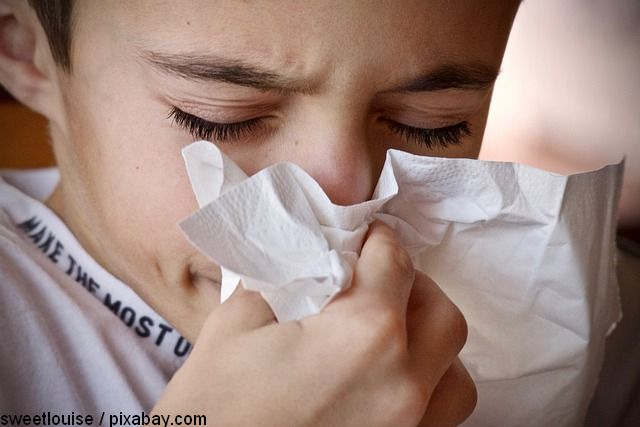Seasonal flu is back with a vengeance
The authorities are considering measures to keep the number of flu infections in check

Roxana Vasile, 10.01.2023, 14:00
For more than two
years, from February 2020, when Romania recorded its first Covid-19 case, until
March 2022, when all pandemic-related restrictions were lifted, words like
cold, viral infection and flu all but disappeared from public discourse.
All this time, both specialists and ordinary people were entirely concerned
with the Sars-CoV-2 infection. The last time Romania faced a seasonal flu
epidemic was in February 2020, right before the start of the Covid-19 pandemic.
After a two-year hiatus, respiratory infections, a common feature of the cold
season, are suddenly back in the spotlight, owing to their rising number. The
infamous Covid-19 waves have now been replaced by an avalanche of flu
cases. Hospitals are crowded and emergency wards are full of people with fever,
cold sweats and a cough. Doctors say Covid-19 coexists with the other types of
viral infections. But how to distinguish between them? Dr. Cătălin Apostolescu,
the manager of the Matei Balş Hospital for Infectious Diseases in Bucharest,
explains:
All diseases caused
by a virus are called viroses. Some of them stand out for their specificities.
One such example is the Sars-CoV infection we’ve known for the last two years.
Another is the flu, which is known for being able to evolve into more severe
cases and even cause death. Yet another example is RSV, the respiratory
syncytial virus, which in children, in particular, can cause severe forms.
There are also other viruses, such as rhinovirus and the local coronaviruses.
Most vulnerable to these viruses are again the youngest and the oldest among
us, as well as patients with various chronic diseases that can influence the
evolution of such a virosis in a negative way. I’m thinking of people with
heart problems, those with respiratory diseases, diabetics and patients with
diseases causing immunosuppression.
So, what is to be
done, given that the effects of the viruses are enhanced, among others, by the
unseasonably warm spell in the weather? The authorities have published a list
of recommendations for the population, urging people to avoid crowded spaces,
wear face masks in enclosed spaces, ventilate rooms, maintain hygiene, stay at
home if they show signs of respiratory infection and ask the advice of their
family doctor from the very first symptoms. Hospitals are recommended to screen
their staff daily, to restrict visitor access and provide protective equipment
for staff who come into direct contact with patients. We don’t want to
introduce restrictions, but to work with the population so that we can keep
this natural, seasonal phenomenon, the flu, under control, health minister
Alexandru Rafila has stressed:
I prefer
recommendations to restrictions. The experience during the pandemic proved we
were right – the situation was much better when we made recommendations, the
population responded much better to them than to restrictions, which also
generated a lot of tension in society. I prefer the population to be our
partner, not to make the situation in general more tense, especially as we are
also faced with a very complicated economic context.
With children going
back to school on 9th January after the Christmas holiday, education minister
Ligia Deca says she is not encouraging pupils to miss school. The rather
unfortunate experience of closing schools or on-line teaching during the
pandemic is not to be repeated. Ligia Deca:
We are in no way
advising against class attendance. After two years of pandemic, we believe it
is important to keep up the pace and have a high percentage of class
attendance. The focus, as I have discussed with the Health Minister, should be
on prevention. There are several recommendations. First of all, families should
make their own triage at home, based on identifying certain symptoms, following
which children should be isolated at home. Then, a daily triage should be
performed when children get to schools. When symptoms are obvious, parents or
legal guardians should be notified. We also recommend the teaching staff and
pupils should wear face masks, although this is not mandatory. We want all
children to have access to education, and if they display symptoms associated
with respiratory diseases, they should be isolated at home and later be given
the opportunity to catch up with school curricula.
What should Romanians
expect this year? Will things return to the normalcy prior to the pandemic, or
will we witness a new episode of the pandemic started in February 2020? No one
knows, even if both optimists and pessimists are confident in their beliefs.
One thing is certain:
every year before the pandemic, Romania went through periods of seasonal flu
from 2 to 4 weeks. The only difference is that they usually peaked in February.
This year, the seasonal flu came earlier, and the cases multiplied particularly
in January. This is owing particularly to the 2020-2022 period, when viruses
spread more slowly due to health restrictions introduced in the context of the
pandemic, yet also because immunity at society level has gone down. In other
words, the Health Ministry says, the current situation is neither unusual, nor
should it raise excessive concerns. (CM & VP)






























